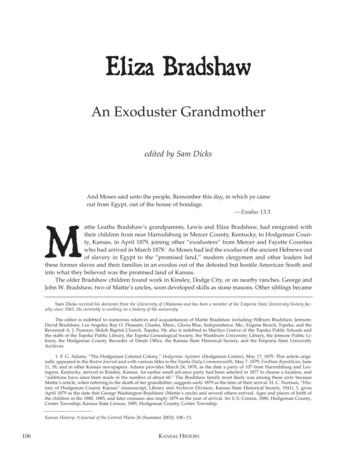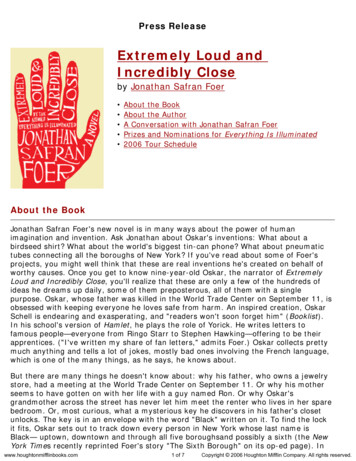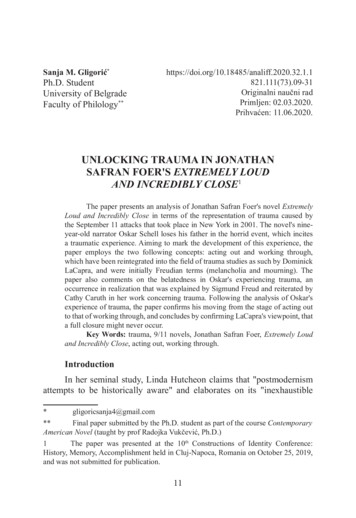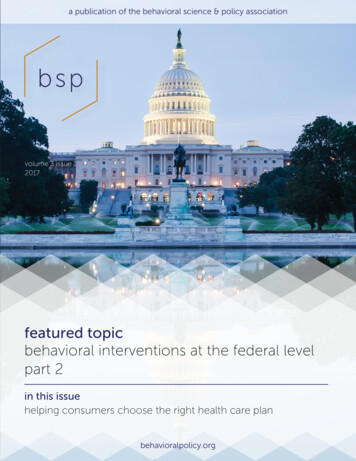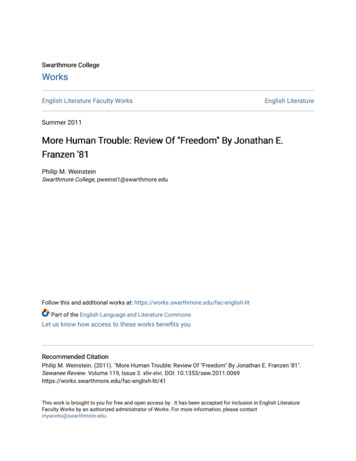
Transcription
Jonathan Bradshaw on Social PolicySelected Writings 1972–2011
Jonathan Bradshaw on Social PolicySelected Writings 1972–2011Edited byRichard Cookson, Roy Sainsburyand Caroline Glendinning
J R Bradshaw, R A Cookson, R Sainsbury and C Glendinning 2013Copyright in the original versions of the essays in this book resideswith the original publishers, as listed in the acknowledgements.Published by University of York.Edited by Richard Cookson, Roy Sainsbury and Caroline Glendinning.All rights reserved. No part of this book may be reproduced, adapted,stored in a retrieval system or transmitted by any means, electronic,mechanical, photocopying, or otherwise without the prior writtenpermission of the copyright holders.The rights of J R Bradshaw, R A Cookson, R Sainsbury andC Glendinning to be identified as the authors of this work have beenasserted in accordance with the Copyright, Designs and Patents Act1988.A CIP catalogue record for this book is available from the BritishLibrary.ISBN 978-1-907265-22-8 (paperback)ISBN 978-1-907265-23-5 (epub)ISBN 978-1-907265-24-2 (mobi)Cover design by Richard Cookson and Clare BrayshawPrepared and printed by:York Publishing Services Ltd64 Hallfield RoadLayerthorpeYork YO31 7ZQTel: 01904 431213Website: www.yps-publishing.co.uk
ContentsNotes on the editorsAcknowledgementsIntroduction1.The taxonomy of social need2.Legalism and discretion133.The family fund: an initiative in social policy354.Energy and social policy715.Evaluating adequacy: the potential of budget standards816.Policy and the employment of lone parents in 20countries1057.Absent fathers?1258.Preface to “Poverty: a study of town life,centennial edition”151Overlaps in dimensions of poverty1959.110. How has the notion of social exclusion developed?21511. An international perspective on child benefit packages24112. An index of child well-being in Europe26313. Trends in child subjective well-being in the UK323
Notes on the editorsRichard CooksonReader, Centre for Health Economics, University of York, UKrichard.cookson@york.ac.ukRichard’s main research interests are in equity in health and healthcare. He worked alongside Jonathan in the Department of SocialPolicy and Social Work from 2006-11.Roy SainsburyProfessor, Social Policy Research Unit, University of York, UKroy.sainsbury@york.ac.ukRoy’s main research interests are in social security, employmentand welfare. He has been a research colleague of Jonathan for over25 years and co-edited the series of books arising from a conferenceto mark the centenary of Seebohm Rowntree’s first study of povertyin York (held in 1998).Caroline GlendinningProfessor, Social Policy Research Unit, University of York, UKcaroline.glendinning@york.ac.ukCaroline’s main research interests are in the fields of ageing,disability and care. She is a long-term colleague of Jonathan’s andworked with him for some 15 years following the establishment ofthe Family Fund Research Project in 1972.
AcknowledgementsWe – the editors of this book – would first of all like to thankJonathan Bradshaw for his help in the preparation of this bookand, in particular, for helping us select the essays and for providingcopies of original publications, producing biographical material forthe introduction and checking the typesetting decisions made inour first draft manuscript.We sought Jonathan’s advice at all stagesof the project but all the final editorial decisions were our own andwe take full responsibility for any errors or omissions.Some of the material reproduced in this volume was jointly authoredor edited. In Jonathan’s own words, “I hope that colleagues willnot feel that in reproducing it here we are implying that it is allmy own work. On the contrary, one of the most enjoyable aspectsof my academic life has been to work in teams and to write withothers. It must be so with big research projects. The joint workremains joint work and many thanks to the co-authors for theircollaborations”.We are also especially grateful to Anne Burton for her sterlingwork in completely overhauling our untidy early version of themanuscript and handling numerous sub-editing, proof readingand production issues so carefully and with such patience andgood humour; to Clare Brayshaw from York Publishing Services(YPS) for her prompt and accurate typesetting of this complexmanuscript – including one chapter with no less than 22 figuresand 10 tables – and her kindness in handling our mountain of timeconsuming further correction requests after the first proof stage; to
Jessica Stephens and Matthew Herring for their persistence withthe copyright clearance work; to to Rachel McAllister, MatthewPeers and Sally Pulleyn in the Social Policy Research Unit for theirhelp with marketing the book, providing ISBN numbers, diggingout references, and updating Jonathan’s website with his full list ofpublications – and to all of the above for the painstaking care andattention they devoted to this book project. We are also gratefulto Duncan Beal, Cathi Poole and Paula Charles at YPS for theirexcellent publication services and to Liz Ingham for her help inmanaging the book project finances.We would also like to thank the following organisations forsupporting this project through financial and in-kind contributions,and the corresponding senior decision makers who authorisedthose contributions: the Joseph Rowntree Foundation and itsDirector of Research and Policy, Emma Stone; the Foundationfor International Studies of Social Security and its President, PeterSaunders, the University of York Digital Library DigitisationProgramme and its Director, Julie Allinson; the University of YorkSocial Policy Research Unit and its Director, Gillian Parker; andthe University of York Deputy Vice-Chancellor’s Office and itsformer office holder, Trevor Sheldon.Finally, we would like to thank and acknowledge the publishersof all the publications listed below for their kind permission toreproduce these original publications in a re-typeset format. Wehave made every effort to obtain all the appropriate authorisationsfrom all the relevant copyright holders.Chapter 1: Bradshaw, J.R. (1972) ‘The taxonomy of social need’,in McLachlan, G. (ed), Problems and Progress in Medical Care,Oxford University Press: Oxford.Chapter 2: Bradshaw, J. (1979) ‘Legalism and Discretion’ in Jones,K., Brown, J. and Bradshaw, J.R. Issues in Social Policy, Routledgeand Kegan Paul: London.
Chapter 3: Bradshaw, J.R. (1980) The Family Fund: An Initiativein Social Policy, Routledge and Kegan Paul: London. Chapter 2.Chapter 4: Bradshaw, J.R. and Harris, T. (eds) (1983) Energy andSocial Policy, Routledge and Kegan Paul: London. Introduction.Chapter 5: Bradshaw, J.R., Mitchell, D. and Morgan, J. (1987)‘Evaluating adequacy: the potential of budget standards’, Journalof Social Policy, 16, 2, 165-181.Chapter 6: Bradshaw, J.R., Kennedy, S., Kilkey, M., Hutton, S.,Corden, A., Eardley, T., Holmes, H. and Neale, J. (1996) Policyand the Employment of Lone Parents in 20 Countries, EuropeanCommission-Social Policy Research Unit: York. Introduction.Chapter 7: Bradshaw, J., Stimson, C., Skinner, C. and Williams,J. (1999) Absent fathers?, Routledge: London. Introduction andConclusion.Chapter 8: Bradshaw, J. (2000) ‘Preface’, In Rowntree, B.S.,Poverty: A Study of Town Life, Centennial ed., The Policy Press:Bristol, pp xix-xxxii.Chapter 9: Bradshaw, J. and Finch, N. (2003) ‘Overlaps inDimensions of Poverty’, Journal of Social Policy, 32, 4, 513-525.Chapter 10: Bradshaw, J. (2004) ‘How has the notion of socialexclusion developed in the European discourse’, The Economicand Labour Relations Review, 14, 2 168-186.Chapter 11: Bradshaw, J. (2009) ‘An international perspective onchild benefit packages’, In Kamerman, S., Phipps, S. and Ben-Arieh,A. (eds) From Child Welfare to Child Well-being: An internationalPerspective on Knowledge in the Service of Policy Making, Springer:Dordrecht. pp 293-308.
Chapter 12: Bradshaw, J. and Richardson, D. (2009) ‘An index ofchild well-being in Europe’, Journal of Child Indicators Research,2, 3, 319.Chapter 13: Bradshaw, J. and Keung, A. (2011). Trends in childsubjective well-being in the UK, Journal of Children’s Services, 6,1, 4-17.
IntroductionRoy Sainsbury, Richard Cookson andCaroline GlendinningHow this book came aboutThe stimulus for this volume was the ‘retirement’ of JonathanBradshaw in 2011 after 46 years as a student, teacher and researcherin social policy at the University of York. Most readers workingin academic institutions will recognise the need for those invertedcommas. ‘Retirement’ rarely means people actually packing theirbags and leaving their offices to pursue whatever pleasures theyhad been denying themselves for years. And so it is that retirementfor Jonathan means that he continues to teach, research and writebut just on a part-time basis and certainly not so well paid.Nevertheless, as colleagues of many years we did want to markhis ‘official’ retirement with something more enduring and tangiblethan the traditional wine, nibbles and speeches. Thus the ideaof this book was born. But what sort of book? In reflecting onthis question we realised that Jonathan’s writing on social policy,covering nearly five decades, was scattered over a vast number ofbooks, journals and reports which, even in the digital age, wereoften difficult to access. We therefore decided to collect togetherthe best of his contributions to serve not only as a celebration andrecognition of a lifetime’s achievement but also, and perhaps morei
importantly, as an introduction to his wide-ranging scholarshipand thinking for future generations of social policy students andscholars, that could inform and hopefully inspire them.Any readers who know Jonathan will understand that we had aconsiderable job in persuading him of the value and appropriatenessof this book project. He is an exceedingly modest man. But we worehim down and began the task of selecting what would eventuallyappear in this book. Working within the usual limitations of spacewe took the approach of identifying the best pieces from acrosshis career and across the many social policy topics on which hehas written. (And here we should acknowledge the time and effortthat he put in to help us make the final selections.) Hence you willfind pieces spanning the 40 years from 1972 to 2011 and coveringsuch diverse topics as theories of social need and discretion,energy poverty, child poverty, lone parents, absent fathers, andchildren’s well-being. We say a bit more about the contents of thebook in a moment. First, however, we feel that some explanationof Jonathan’s background might not only be interesting but alsoenhance an understanding of why he has devoted so much of hisprofessional life and energy to the study of social policy and to itsimpact on the world.(For a full and up-to-date list of Jonathan’s publications includinga growing number of important contributions written after the2011 cut-off point for this book – i.e. the date of his ‘retirement’– please visit his website at the University of York Social PolicyResearch Unit by typing in the short link bit.ly/JBradshaw directlyinto your browser).How Jonathan Bradshaw found social policyJonathan was born in 1944, the second of five children, to Peterand Daphne Bradshaw. His father was a serving soldier who leftthe army in 1946 after the Second World War to study theology atCambridge before becoming a priest (ending his career as CanonResident of Norwich Cathedral). His mother became a teacher inii
later life but died young of pre-senile dementia. Jonathan’s schoolingwas, in his own words, ‘a misery’ and he did not flourish as a youngstudent. He flirted with the idea of joining the Royal Navy and themerchant navy, but eventually stayed on at school to complete his‘A’ Levels. However his grades were not good enough to get intoCambridge as he had hoped, and he spent the year following school(well before ‘gap years’ were invented) doing voluntary serviceoverseas (VSO) in Africa. In that time he worked with refugeesand organised famine relief in what was then Tanganyika and isnow Tanzania, following independence from Britain in 1961 andbecoming a Republic in 1962 (an historical event that Jonathanwitnessed in person in the northwest town of Bukoba where, as wemight expect, he organised the republic celebrations).Returning home in 1963 Jonathan took up a place to read Mentaland Moral Science at Trinity College, Dublin where many of hislong line of Irish forebears had studied. He describes how a lifein philosophy did not suit him at the time and that, after readingThe Last Refuge, Peter Townsend’s pioneering study of residentialhomes for old people in England and Wales, he made what wouldturn out to be a life-changing switch to Social Studies. In the early1960s Social Studies in Dublin had a strong practical element andhe spent time on placements in London and Ireland where he gainedfurther first-hand knowledge of the lives of people experiencingdisadvantage and severe hardship.By the time he left Trinity in 1967 with a first class degree, Jonathanhad been transformed from an unhappy, unpromising schoolboyinto a determined and focused young academic. His experiencesto this point had engendered a deepening desire to promote socialjustice. He chose therefore to continue his studies and enrolledon a postgraduate Masters course in the Department of SocialAdministration and Social Work at the University of York. HisMasters dissertation on poverty among older people in York wasthe source for one of his most cited pieces, a theoretical explorationof the ‘taxonomy of social need’ (reproduced in this volume iniii
Chapter 1). This classic paper, written more than four decades ago,remains a staple of student essays and introductory textbooks andcourses on social policy and exemplifies the clarity and concision ofJonathan’s writing style.Whilst still on his Masters course, he was appointed to the post ofResearch Fellow and then quickly promoted to Lecturer in 1969. Inthose days Jonathan was not content, however, to promote socialjustice through academic channels alone. In his early years in Yorkhe started a welfare rights stall in the city centre market with hisfriend and fellow researcher, Malcolm Wicks, who was eventuallyto become a Labour MP and Minister (before his untimely deathin 2012). Together, they then set up a local branch of the ChildPoverty Action Group. Jonathan also became a York councillor in1970 (until 1974) and unsuccessfully contested the Parliamentaryseat of Thirsk and Malton for Labour, also in 1970.His academic interests became more focused on children andfamilies in 1973 when he was appointed to lead the FamilyFund Research Project set up with funding from the then JosephRowntree Memorial Trust (later the Joseph Rowntree Foundation).This project aimed to monitor and evaluate the Family Fund, agovernment scheme to disburse financial help to young people withserious disabilities. The scheme arose following the Thalidomidedisaster of the early 1960s when evidence began to emerge ofwidespread financial hardship among many families with a severelydisabled child, not only those with a child affected by Thalidomide.He later wrote his doctoral dissertation on the Fund and wasawarded a DPhil from the University of York in 1978. (Chapter3 of this volume contains his account of the origins of the Fund.)The Family Fund Research Project evolved into the Social PolicyResearch Unit, and Jonathan became its first Director. Under hisleadership the Unit quickly became established and expanded intothe wider areas of social care and social security.Since the 1970s Jonathan has continued his long and distinguishedassociation with social policy teaching and research at York, andiv
has held major academic management roles within the Universityalmost continuously up until his retirement. He served as Directorof the Social Policy Research Unit for 14 years, passing the mantleon to his former student and colleague Sally Baldwin in 1987. Hethen served as Head of Department for Social Policy and SocialWork from 1988-1994, then four years as Director of the Institutefor Research in the Social Sciences from 1994 to 1998, and afurther term of office as Head of Department for Social Policy andSocial Work from 2003-2007.What you will find in this bookIn his long career Jonathan’s output has been immense, and it hasbeen a near impossible task to select the pieces that appear in thisvolume. In making the final choices we have tried to do justice tothree areas of research where he has made a particularly importantcontribution: (1) the study of poverty and the championing ofbudget standards approaches for setting rates of social securitybenefits, (2) the use of ‘model family’ techniques for conductingcomparative research, and (3) the development of measures ofchild well-being.The study of poverty has a long connection with York. In the1890s Seebohm Rowntree conducted the first of his three studies ofpoverty in the city. (It was eventually published in 1901.) Rowntree’sprimary aim was to establish, through empirical analysis, a basiclevel of subsistence income that families should be provided withthat would allow them to survive. In today’s terminology he wasusing a budget standards approach – gathering information onwhat goods and services people needed to live. This approachto the study of poverty was challenged by Townsend and othersin the 1960s as denying people the opportunity to participate insociety in ways considered normal to most members of the public.The notion of ‘relative poverty’ was developed and represented aparadigm shift in the way policy debates about the alleviation ofpoverty were conducted.v
Jonathan embraced this way of thinking about poverty butcame to recognise in the 1980s that it appeared to be havinglittle influence on policy under the Conservative governments ofMargaret Thatcher. He, along with others, realised that anotherstrategy was needed. So he turned his thinking once more to thebudget standards approach of Rowntree. From this point he,and others, established the Family Budget Unit (FBU) in 1987 topromote and develop the methodology of budget standards as ameans of determining benefit levels. The FBU was wound up in2011 but the legacy of its work can be found in the flourishingstudy of ‘minimum income standards’ in the UK and abroad. Inparticular the FBU championed the innovative use of focus groupsof members of the public to inform decisions about what itemsof expenditure should be considered reasonable to include in abasket of goods representing an adequate income in contemporarysociety. This effectively introduced an element of democratisationinto policy research which was further developed in the work onminimum income standards by Sue Middleton and colleagues atLoughborough University. Readers are directed particularly toChapters 5, 8, 9 and 10 to explore Jonathan’s contribution to thestudy of poverty and budget standards, and encouraged to explorefurther important works on this subject in his full bibliography.1Jonathan’s first excursion into comparative research wasprompted by the prospect in 1979 that the incoming Conservativegovernment would abolish universal child benefits. Working withDavid Piachaud at the London School of Economics he set out tointroduce a new line of evidence to oppose this development inpolicy. In his own words, he ‘trudged round European countriescollecting data on benefit and tax systems’ in order to demonstratethat universal child benefits were the norm across the developedworld. The technique they used to compare across different1 Short web link bit.ly/JBradshaw. A recommended example is a 2008 reportfor the Joseph Rowntree Foundation entitled “A minimum income standardfor Britain: What people think” (freely available from the JRF website).vi
countries was the ‘model family method’ of Kamerman and Kahn2,a technique that Jonathan has since adopted with colleagues inYork on studies covering for example social assistance, housingbenefit, and child support policy. His more recent reflections onmodel families, openly acknowledging both the strengths andlimitations of the approach, can be found in Chapter 12 of thisvolume.This early work, conducted with colleagues, prompted a widerinterest in international comparative research. He has a large (andstill growing) portfolio of comparative studies based on analyses oflarge micro-data sets such as the Luxembourg Income Study, theEuropean Community Household Panel and the European UnionStatistics on Income and Living Conditions.His most recent research has been in the pioneering developmentof measures of child well-being in the UK and in comparativeperspective. In 2013 we have perhaps become used to the notionthat measures of Gross Domestic Product (at the macro level) orfamily incomes (at the micro level) fail to capture the reality ofpeople’s lived experiences. The fact that governments are preparednot only to acknowledge ‘happiness’ and ‘well-being’ as validconcepts, but also put considerable resources into measuring them,is testament to the extent to which old thinking about poverty andliving standards has shifted. Jonathan’s and colleagues’ work herehas been particularly influential.Jonathan and others produced in 2001 the first of now four bookson the well-being of children in the UK. The reports provide acomprehensive analysis of what well-being means for childrenacross a number of distinct but related domains, including home,family and friends, money and possessions, school, health,appearance, and choice and autonomy. Importantly, the analyses2 Kamerman. S. and Kahn. A. (Eds.). (1978). Family policy: Government andfamilies in fourteen countries. New York: Columbia University Press.vii
give prominence to subjective well-being which draws on children’sfeelings of happiness and self-esteem. Using subjective well-beingin an overall measure of well-being has its critics among thosewho prefer to use only objective criteria such as income, housingor health status. But as Jonathan has countered: “to argue thatsubjective well-being does not matter is to argue that people’sown feelings about their quality of life do not matter.” His morerecent work has focussed on subjective well-being in a series ofcollaborative studies with The Children’s Society.With colleagues he produced the first comparative study of childwell-being in Europe in 2005. On the basis of this work he wascommissioned by UNICEF to carry out a cross-country analysis ofchild well-being in 21 industrialised OECD nations. The UNICEFreport in 2007 was something of a landmark in debates of childwell-being in the UK when it was revealed in a league tablecombining all the different domains of well-being that the UK wasat the bottom. The response from the Labour government waspredictably defensive but the report served as a wake-up call andprovided a benchmark against which the future impact of policyon children and families could be judged. If we fast forward tothe latest version of the UNICEF analysis based on 2010 data wefind the position of the UK improved to 16th out of an expandednumber of 29 countries. It would be bad science to attribute thisimprovement to Jonathan’s or anyone else’s research but it canat least be claimed that his work has led to children’s well-beingbeing treated seriously by UK governments. A small and probablyinadequate recognition of his contribution to the study of children’swell-being can be found in Chapters 11 and 13.3We have concentrated in this introduction on Jonathan’smost central and lasting contributions to the study of poverty,comparative methodology and child well-being. However, we also3 Further detail on the origins and development of international “leaguetables” of child wellbeing can be found on Jonathan’s website atthe University of York Social Policy Research Unit at short web linkbit.ly/UnicefJB.viii
commend the other chapters in this volume that we have chosento represent the wide span of his scholarship and contributionto policy across time and subject matter – on topics as diverse aslegalism and discretion, energy poverty, lone parents and absentfathers. There is much to gain and to enjoy in visiting or revisitingthem. Please do.Some concluding wordsIt is difficult to sum up Jonathan’s contribution to social policy,but perhaps we can highlight one aspect of his work that pervadeshis research throughout: the innovative use of large datasetsto produce detailed, systematic and robust evidence of socialinequalities in clear, accessible outputs that demand to be takenseriously. Like many other social policy scholars in Britain andacross the world he follows in a long tradition of influential socialresearchers beginning with Charles Booth and Seebohm Rowntreein the UK who pioneered the use of large-scale, quantitative studiesof poverty at the end of the nineteenth century. However whileBooth and Rowntree worked with data they generated themselvesfrom one off surveys of a single city (though ground-breaking at thetime), Jonathan has been able to draw on multiple waves of dataacross countries and continents enabling him to deliver powerfulresearch findings that resonate well beyond the shores of Britainand establishing him as one of our foremost comparative socialresearchers.It has been a pleasure for us to have worked on this book. In doingso, we have been further convinced of the immense contributionJonathan has made to social policy and to the study of poverty.This is not only our opinion. Recognition of the esteem in whichhe is held within the national and international social policycommunities can be found in his award of a Lifetime AchievementAward by the UK Social Policy Association in 2007 and hisPresidency of the Foundation for International Studies of SocialSecurity from 1998 to 2003. Recognition of the wider importanceof his work within academia and society as a whole is also evidentix
from his election as a Fellow of the British Academy in 2010 andthe award of a CBE in the 2005 Queen’s Birthday Honours List‘for services to child poverty’.As we have mentioned, Jonathan Bradshaw is ‘retired’ but continuesto teach, write and research on the subjects closest to his heart– child poverty and child well-being. Despite his contributions toresearch and policy he would be the first to admit that the problemsof poverty in general and child poverty in particular have not beeneradicated. At the time of writing this in 2013 the prospects arethat these problems will become worse in the short term as theeconomic effects of recession and austerity bite deeper. There is stilla pressing need therefore for the type of work that Jonathan haspioneered over the past 45 years. Expect to hear more from him inhis retirement.x
1A Taxonomy of Social Need*One of the most crucial problems facing the social services ishow to identify social need. This article attempts to provide aframework for clearer thinking about need.The concept of social need is inherent in the idea of social service.The history of the social services is the story of the recognition ofneeds and the organization of society to meet them. The SeebohmReport (1) was deeply concerned with the concept of need, thoughit never succeeded in defining it. It saw that ‘The Personal SocialServices are large scale experiments in ways of helping those inneed’.Despite this interest it is often not clear in a particular situationwhat is meant by social need. When a statement is made to theeffect that a person or group of persons are in need of a givenservice, what is the quality that differentiates them – what definitionof social need is being used?* Bradshaw, J.R. (1972) ‘The taxonomy of social need’, in McLachlan, G.(ed), Problems and Progress in Medical Care, Oxford University Press:Oxford.1
essays in social policy 1972–2011The concept of social need is of particular interest to economists.They have a clearcut measure of ‘effective demand’: demandis ‘effective’ when people are prepared to back it by pecuniaryallocation and ineffective or non-existent when they are not.This measure will not do for the social services, because thereis normally no link between service and payment (though someeconomists think there ought to be). If the social services are tryingto cope with need without limiting it by the ability to pay, how isit actually assessed?In practice, four separate definitions are used by administratorsand research workers.1. Normative NeedNormative need is that which the expert or professional,administrator or social scientist defines as need in any givensituation. A ‘desirable’ standard is laid down and is compared withthe standard that actually exists – if an individual or group falls shortof the desirable standard then they are identified as being in need.Thus the BMA’s nutritional standard is used as a normative measureof the adequacy of a diet (2). The Incapacity Scale developed byTownsend (3) and the measure of social isolation used by Tunstall(4) are also examples of normative standards used as a basis ofneed. A normative definition of need is in no sense absolute. It maynot correspond with need established by other definitions. It maybe tainted with a charge of paternalism-i.e. the use of middle-classnorms to assess need in a working-class context – though where theaspirations are to middle-class standards this may be reasonable. Afurther difficulty with the normative definition of need is that theremay well be different and possibly conflicting standards laid downby different experts. The decision about what is desirable is notmade in a vacuum. As Walton (5) has pointed out, the statement ‘Xis in need’ is often taken as an empirical fact. This is not so. It is avalue-judgement entailing the following propositions: X is in a stateY, Y is incompatible with the values held in society Z. Therefore Ysta
Introduction 1. The taxonomy of social need 1 2. Legalism and discretion 13 3. The family fund: an initiative in social policy 35 4. Energy and social policy 71 5. Evaluating adequacy: the potential of budget standards 81 6. Policy and the employment of lone parents in 20 countries 105 7. Absent fathers? 125 8. Preface to "Poverty: a study of .



